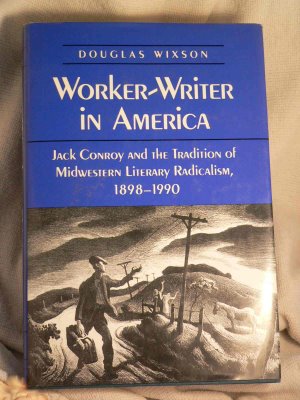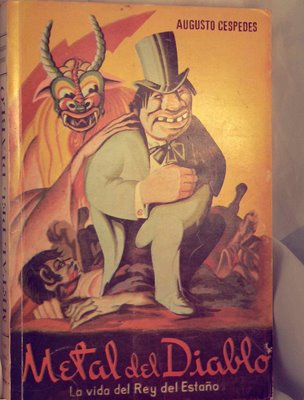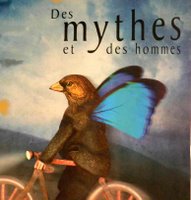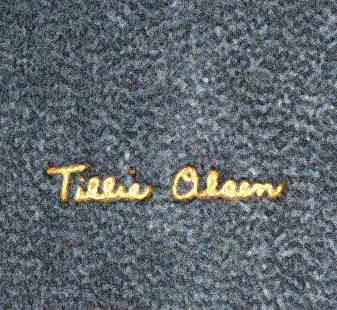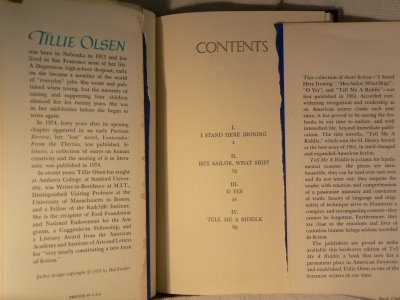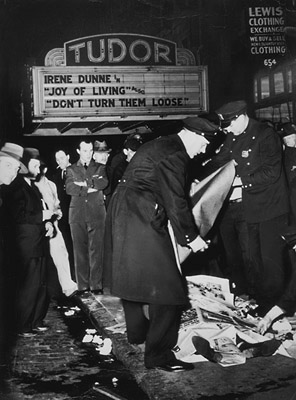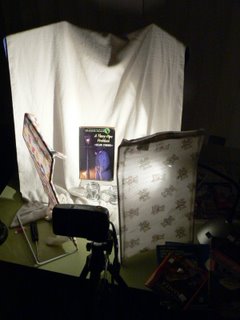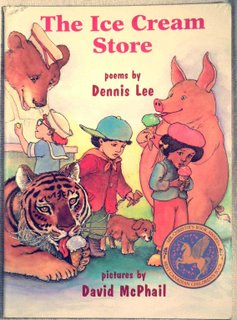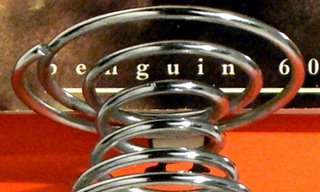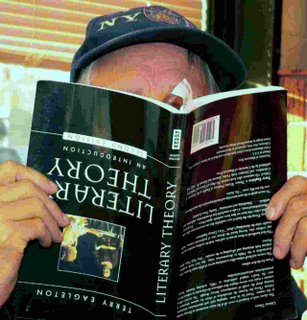Random Thoughts
I cut up today to just enjoy today's
Montréal version of our own episodic
'winter of globalwarming discontent'. It ended up being an 11-hour jaunt from my breakfast venue, where they hadn't even turned on the lights yet when I arrived at 7:00 am, and then a bus-metro ride up past
Jean Talon Market, past
Little Italy, to pick up cheap books at my favorite friperie. Finally (though it must have amounted to 6 or 7 hours of a slow saunter south through the
Plateau Mont Royal), I made my way down
The Main on my return trip by foot.
Along the way I read some interesting books, including a broadsheet by
Stéphane Mallarmé in a deluxe edition. So, from a literary standpoint, my day wasn't entirely wasted.
Everywhere I went, books fell on the floor around me. Except in the funeral parlour, thank God'. . . "Funeral parlour!" I know you're asking, but be patient, we'll get there.
At the
friperie I picked up sheer polyester material to use as a backdrop and as a diffusion screen for my photo lightbox ($4.00 worth = two French-gathered full-length curtains). I also buy $8.00 worth of secondhand books, including titles that
ALL local undergrads are always shopping for - things like
Hernann Hesse,
Virginia Woolf, a
'gender studies' title or two,
et cetera -- Hell, I don't remember all of the titles: it's
stuff I have coming out the
yazoo anyway. Stuff that I buy to trade-off. (Though I love both authors -
don't get me wrong.)
PLUS I discovered and buy (included in the $8 price-tag) what I dearly strive to collect wherever I can. This includes today's "Le Passager", by
Gilbert La Rocque (Montréal: Québec-Amérique, 1984) and
"jimmy', by
Jacques Poulin (Montréal: Éditions du jour, 1969). Both are what I call
cheap priceless editions,
quoi? I'll blog both titles sometime soon, including photos of the covers.
Another
klutz thing I did: I immediately, upon leaving the place, imagine that I have lost my wallet in the secondhand junk emporium (
friperie) I've just left. That somebody has picked my pocket. So I go back and raise a stink and get everybody on-edge. Then I reach in my backpack to discover that I had placed my wallet in the same bag as the books - wrapped inside the curtain material. Well, everybody at the friperie was as relieved as I was at that final
dénoument to me being a
klutz.
So where do I end up next? After walking around Jean Talon and its juncture with Boulevard St. Laurent to get my bearings, I head south. And end up in a friggin funeral parlour, that's where!
I see this sign that advertises a 'café-bibliotheque-bookstore' thingy; a sort of bookish café. That's my bag: arts cafés that sell books. So I go in. But, despite the artsy aspect of the place, it turns out to be a friggin real funeral parlour!
Toute la patente. The real thing. I ask, naturally, and they tell me that the café is upstairs, above the salon where bodies are 'exposed'.
So I go upstairs. All the friggin books are about how to deal with mourning -
le deuil. Or religion; or . . get this: tons of poetry. By poets I love.
Stéphane Mallarmé is there in 'luxury editions'. This, my friend, is a funeral parlour like no other you have ever, ever seen. This is
Art in the service of
Death, or, if not Death per se, in the service of taking as many dollars from the folks left mourning a loved one as is possible by selling them
Art and
Poetry to carry them through their sorrows! It is a restaurant attached to a funeral parlour. Both are immaculately up-scale and, as they say,
branchés (translation: '
hip').
Am I indignant? No. Am I flabbergasted?
Yes. Do I know what to think about it? No.
I was not born yesterday; or, in French,
dans la dernière pluie.
Urgel Bourgie, the chain of funeral parours by far the best known in Montréal, can afford to set up both an Art Gallery and a café-bookstore for select clients; it is 'On The Main' in Montréal. Do you have such a thing in your community? Where the 'Art' sells for +$1,000 and
galley folios of famous poems for over $60 ? Well bite my ass! In Australia, Massachusetts, in Maine and the U.K., in France and in Des Moines you all have such high class, literary and hip funeral parlors? Bite my ass double-time! (Kurt Vonnegut, (remember his Iowa City days?) once imagined this industry of 'cool' dying in a novel. Sorry I mentioned it.)
So from there I saunter down
St. Lawrence Street, down toward haunts with which I feel
inordinately more familiar. (I did not pop $60 for the Mallarmé poem nor any 'lesser amounts' for all the religious, esoteric, or the 'dealing with loss' pop lit that
Urgel Bougie offers for sale in their café .. er funeral home . . er . . WHATEVER. (If I had the money though . . Urgel Bourgie would have made another pile of dough!)
What I did 'pop into', eventually, was a familiar secondhand, used bookstore further on down the line. (I know the owner and his cat.) Here, at W's bookstore, I lounged around with a little less trepidation than in the funeral parlour cum lit-café. After discovering what I wanted as book "purchases", including two books by
Tillie Olsen and a novel I'd ignored the existence of = "By the Sound" by
Edward Dorn, in a
Black Sparrow Press edition,
I end up trading off what I had found in the
friperie for what I REALLY wanted to buy, but could not otherwise afford.
You could say that already I am ahead of the game. And despite the unusually warm weather and fact that
our entire planet is going to hell in a handbasket.
I, at least in the imagination of one day, stay on top of the game. (Do I feel guilty a bit?
ùyes. This could be my last hoorah. Who knows anything, with this globally warm weather? I don't. Nobody around Québec knows what to make of the weather . . what to make of this bizaare winter in Canada. Does
Urgel Bourgie) the funeral director?
But
'yet and still' your entrepid reporter has more territory to conquer. I drop into a Spanish books-groceries-kitchen-utensils store on
The Main and shop the literature in Spanish. Through some fluke, some misunderstanding about how to translate the word 'listado', the owner-clerk gives away (she actually says 'take it') the
Augusto Cespedes title "Metal del Diablo: La Vida de Rey del Estano" after I show her my (recently acquired at the friperie) copy of "Antologia Poetica" by
Amado Nervo. I'm not complaining, though I do suspect I've just now engaged in some weird form of shoplifting. Aided by my weak mastery of Spanish.
So all-in-all I'm a happy camper, a successful player of hooky, today. Maybe I have a stack of books that nobody would buy if I decide to offer them for sale on the Internet. (I doubt that, though.) I go home happy. And enlightened about books, poetry and about Montréal as our town evolves.
I do have second thoughts about poetry, about what I like, and about the industry of death that is so profitable. Maybe I should go into another line of work.

